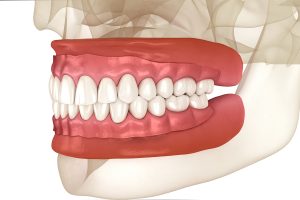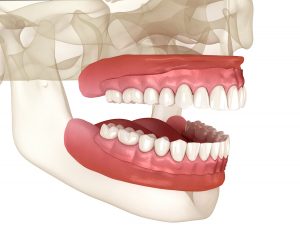Dentures are removable devices that fit in the mouth in order to replace missing teeth. They are a very useful option, as they give the flexibility to replace one, many (partial denture), or all teeth (full denture) in an arch, with a single device.
When fitted correctly they can be worn comfortably for a number of years whilst improving chewing, aiding speech, enhancing facial expressions and confidence. If you need to have a tooth removed, an “immediate” denture can often be made in advance; if it is a highly visible tooth, this can be a very good way to ensure continuity of appearance and function.
Dentures are prosthetic devices comprised of replacement artificial acrylic teeth, which are attached to a denture base designed to fit the contours of the mouth. They are used to replace missing or extracted teeth caused by genetic developmental irregularities, injury, malnutrition, tooth decay and gum disease.

The denture base can be made from acrylic, which will usually cover a good proportion of the palate. Alternatively, the denture base can be made from a cobalt-chrome (co-cr) metal framework; these have the advantage of being thinner on the palate, as well as often leaving much of it exposed.
Palatal coverage results in a loss of temperature sensitivity in the mouth, so co-cr dentures tend to be more comfortable. Acrylic dentures are suitable for both partial and full designs, whilst co-cr dentures are more useful for replacing a few teeth rather than a full arch (although this is possible).
There are a number of ways in which dentures are designed and made by your dentist in conjunction with their laboratory, to ensure that they are both comfortable, and stable. We always incorporate features to help them stay in place and move as little as possible when talking and eating.
*Note: Clasps can also be incorporated into acrylic dentures, but rest seats cannot.

Your dentist will take an impression of your mouth which is then sent to a lab, together with a record of the colour of your natural teeth. There then follow a few short appointments, usually a week apart as each stage of the denture manufacture is advanced, resulting in dentures to fit your oral specifications.
Your denture can last many years if it is looked after properly. It needs to be cleaned every day, like normal teeth, to remove plaque, so that tartar build-up doesn’t cause gum disease in the mouth.
When a patient receives their custom-made dentures, the dentist provides them with guidance on how best to care for their dentures for optimal wear.
Wearing dentures can pose some challenges affecting oral function, aesthetics and comfort. The main concerns are denture stability, support and retention.
Mobile or poorly designed dentures may:
With time oral tissues may shrink and this will cause the dentures to start to move. Denture instability can sometimes be improved by relining them. The discrepancy between the shape of the denture and that of the mouth is corrected so that the fit is more accurate. Addition of clasps can also help, but sometimes there is no solution other than to make a new set of dentures.
With proper care, dentures can last between 5-10 years. However, natural changes in your mouth may require adjustments over time.
Dentures should be cleaned daily using a soft brush and denture-specific cleaner. We also recommend using cleaning tablets (such as Dentipur, available at our practice) a few times a week.
It is best to remove your dentures at night to allow your gums to rest and to reduce the risk of irritation or infections like denture stomatitis.

Fill in the form and our friendly team will be in touch with you momentarily
Heathwood Dental is a fantastic dental practice. Dr Vishal Kumar is very knowledgeable, highly skilled and always takes the time to talk through any proposed treatment and particular techniques/materi… Read More
I’m one step closer to my brand new tooth, despite being MANY years past the age of new teeth. Thanks to Neena and Mariska at Heathwood Dental I had a smooth, pain free, easy impant of the ‘socket’ in… Read More
I transferred to the Kings Road site when Vishal took over Heathwood Dental Practice from Dr Smith in 2005, it formerly being located in Ellis Road. Moving from a known dentist to someone new has alwa… Read More
I cannot praise Heathwood Dental practice enough. All staff are extremely easy to deal with and pleasant. I have been treated for many years by Dr. Vishal Kumar and would recommend him to anyone. He i… Read More
Absolutely first rate service. Incredible expertise and use the latest techniques and materials. I travel nearly an hour to go here as it’s by far, the best practise I have ever been to by a considera… Read More